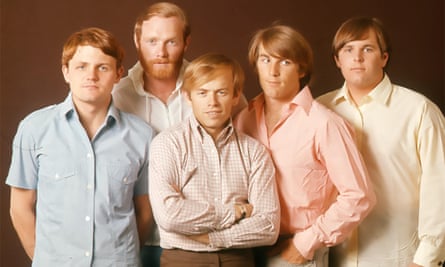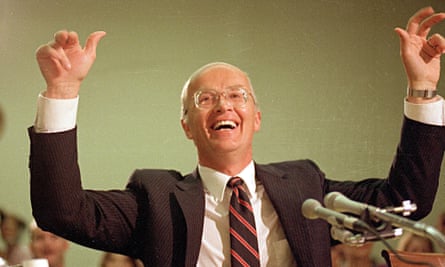Forty years ago, Ronald Reagan’s interior secretary, James Watt, decided to take a stand for “wholesomeness”, against undesirable elements. The Beach Boys, he announced, would be banned from the 1983 Independence Day celebrations on the National Mall.
Watt, who died in May at 85, was a lightning rod of a cabinet secretary who compared environmentalists to Nazis and divided fellow citizens into ‘‘liberals and Americans”. According to him, “hard rock” bands like the Beach Boys attracted the “wrong element” – drug-using, boozing youngsters.
The decision was so out-of-step with American society – the Beach Boys were not the Dead Kennedys, after all – that he ran afoul of Beach Boys fans in the corridors of power, among them Reagan, his wife Nancy Reagan and the vice-president, George HW Bush.
It would be hard to think of a more quintessential American pop band than the Beach Boys, whose hits include Good Vibrations, Surfin’ USA, Fun, Fun, Fun and Wouldn’t It Be Nice.
“They are what America is,” Elton John has said. “A very wonderful place.”
The backdrop to this contrived culture war episode was the appearance, over the previous three years, of the Beach Boys (1980 and 1981) and the Grass Roots (1982) in front of hundreds of thousands at July 4 celebrations in Washington DC.
Watt was head of the interior department, with jurisdiction over the National Park Service, which organized such events. As a Pentecostal fundamentalist who didn’t smoke or drink, he announced that he was banning rock music from Independence Day festivities. Citing “repulsive” reports in the first two years of the Reagan administration of “high drug use, high alcoholism, broken bottles, some injured people, some fights”, Watt lined up instead “patriotic, family-based entertainment” from figures including Wayne Newton, a friend and supporter of Reagan.
“We’re trying to have an impact for wholesomeness,” Watt said, adding: “July 4 will be a traditional ceremony for the family and for solid, clean American lives. We’re not going to encourage drug abuse and alcoholism as was done in the past years.
“… The reason for the arrests and other trouble, we concluded, was that we had the rock bands attracting the wrong element, and you couldn’t bring your family, your children, down to the Mall for a Fourth of July picnic in the great traditional sense because you’d be mugged by … the wrong element, whatever is the nice way to say it.”
But as the Washington Post reported, “a ban on apple pie couldn’t have brought a stronger reaction”.
A Washington talk show host linked the controversy to a major issue of the day: “I haven’t seen the phones ring over here as steadily or heard more strong comments since the Iranian hostage takeover. Our audience regards the Beach Boys as much a part of Americana as Wayne Newton.”
The New York Times also referred to Iran, likening Watt to the Ayatollah Khomenei, who among his “first acts on seizing power after the Iranian revolution … ban[ned] western music because it made listeners’ brains ‘inactive and frivolous’”.
In their own statement, the band said it was “unbelievable that James Watt feels that the Beach Boys attract ‘the wrong element’ … over their 20-year career, the group has participated in many events geared specifically to the very families Watt claims they turn away”.
Slightly bizarrely, they added: “The Soviet Union had enough confidence in the Beach Boys to invite them to perform in Leningrad [on] July 4 1978. Obviously the Soviet Union, a much more controlled society than our own, did not feel the group attracted the wrong element.”
On Capitol Hill, scorn was bipartisan.
“‘Help me, Ronald, don’t let him run wild,” said George Miller, a Democratic congressman from California, spoofing the Beach Boys song Help Me, Rhonda.
“The Beach Boys are not hazardous to your health,” said Bob Dole, the Kansas Republican senator.
Nor was Watt backed by his bosses.
“They’re my friends and I like their music,” Bush, the vice-president, said of the Beach Boys, who played a concert for him during his 1980 presidential run.
Michael Deaver, the White House deputy chief of staff, said:“I think for a lot of people the Beach Boys are an American institution. Anyone who thinks they are hard rock would think Mantovani plays jazz.”
A White House spokesman told reporters the Beach Boys would “be welcome on the Mall”.

Reagan had a little fun at Watt’s expense. Saying he had ordered his special ambassador to the Middle East “to settle the Jim Watt-Beach Boy controversy”, the president also presented Watt with a plaster foot with a bullet hole.
Watt retreated. Standing on the White House lawn, holding his plaster foot, Watt said: “Obviously, I didn’t know anything to start with. The president is a friend of the Beach Boys. He likes them, and I’m sure when I get to meet them, I’ll like them.”
Watt also said Nancy Reagan had told him “the Beach Boys are fans of hers, and her children have grown up with them and they’re fine, outstanding people and that there should be no intention to indicate that they cause problems, which I would agree with”.
Watt said the Beach Boys would appear. But it was too late: they played Atlantic City instead.
That fall, Watt resigned. The Beach Boys returned to the Mall the next July 4, attracting more than half-a-million, then played again in 1985. That year, the lead singer, Mike Love, defended Watt: “He said rock music attracts the wrong element, and that’s true. Rock groups do sing pornographic lyrics, satanic lyrics, but we’re certainly not one of those groups. We’re no more satanic than Pat Boone.”
In his autobiography, Watt tried to shrug off the blame. The controversy was the work of the “liberal press”, he said.

